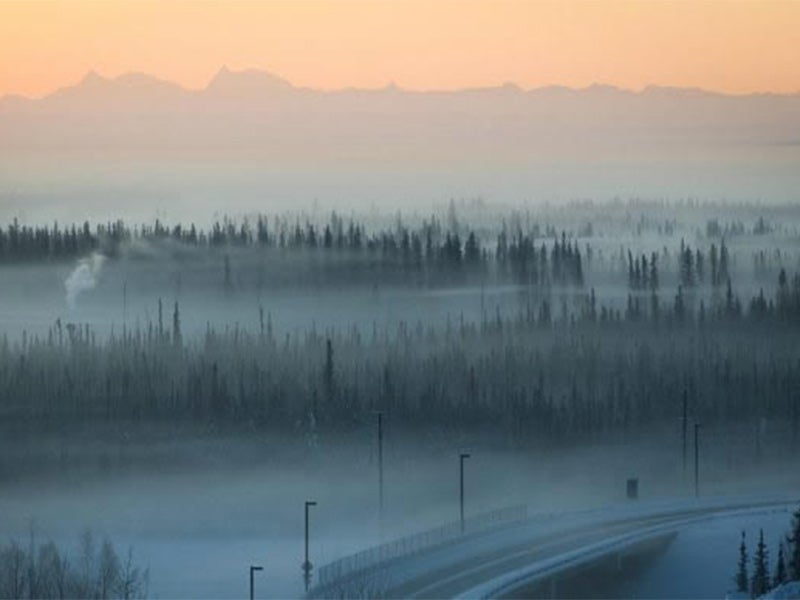Earthjustice stands with western Alaska tribes and families after severe storms devastated entire communities, displacing more than 1,000 residents just before winter. Learn more and how you can help.
Fairbanks Community Groups, Frustrated Over Lack of Action To Address Dirty Air, Notify of Intent To Sue EPA for Missing Its Third Deadline in Two Years
The Fairbanks North Star Borough has the worst episodes of fine particulate matter air pollution in the nation, but EPA has yet to take adequate action to improve air quality
Contact
Today, Citizens for Clean Air, Alaska Community Action on Toxics, and the Sierra Club sent notice of intent to sue the U.S. Environmental Protection Agency (EPA) for missing a third deadline in two years for addressing Fairbanks’s air pollution problem. The groups called on the agency to meet its obligations under the law to require the Fairbanks North Star Borough to address its pollution controls because it is overdue in meeting basic clean air standards.
The Fairbanks North Star Borough has the worst spikes in fine particulate matter air pollution in the nation.
The Fairbanks North Star Borough has the worst spikes in fine particulate matter air pollution in the nation—with levels spiking far in excess of the next most-polluted area and over three and a half times the recommended limit for unhealthy air. The air pollution problems have worsened since 2009, when state and municipal officials were first advised that soot and smoke levels in Fairbanks were unhealthy and dangerous.
The type of fine particulate matter pollution prevalent in Fairbanks—2.5 micrometers or less in diameter—has been found to cause a wide range of serious health problems, including asthma attacks, chronic respiratory disease, reduction in lung function, hospitalizations and emergency room visits for cardiopulmonary diseases, cancer, and even premature death. Fine particulate matter air pollution is of particular danger to children, reducing lung development, causing asthma, and impairing the immune system. The elderly and those with chronic disease also face heightened risks.
Sources of PM-2.5 in Fairbanks include outdoor burning; wood- and coal-burning heating devices; automobiles and other vehicles; and industrial facilities like coal-fired power plants.
The Clean Air Act requires areas like Fairbanks that fail to meet clean air standards to bring themselves into compliance within six years of being deemed non-compliant. Fairbanks has missed this deadline—in fact, it doesn’t even have an approved plan to bring itself into compliance—and the law requires EPA now to designate the Borough as a “serious non-attainment area,” triggering stricter pollution control requirements to finally bring the area into compliance. EPA has missed its deadline to re-designate the area, and the groups are notifying the agency of their intent to sue to enforce this latest in a string of missed deadlines.
The groups have already been forced to sue EPA twice in the past two years. In April 2014, the groups sued EPA for failing to move the state planning process for cleaning Fairbank’s air forward. This helped prompt the State of Alaska to submit an overdue plan to address air pollution to EPA at the end of January 2015.
In June of this year, the groups sued EPA for its failure to approve or disapprove the State’s plan by the statutory deadline. The groups are now seeking to compel the agency to perform its duty under the Clean Air Act to determine that the Fairbanks North Star Borough has failed to reach air quality standards and to reclassify the Borough as seriously out of compliance and thus subject to stricter pollution controls.
Citizens for Clean Air, Alaska Community Action on Toxics, and the Sierra Club submitted a notice of intent to sue to EPA if the agency does not fulfill this mandatory duty. The groups are represented by non-profit environmental law firm Earthjustice’s Alaska office.
Read the notice of intent letter.
Statements:
Kenta Tsuda, Associate Attorney, Earthjustice: “EPA has now missed a second deadline this year to clean up Fairbanks’s air, the third since 2014. We are resolved to enforce the government’s duty to address bad air in Fairbanks—and in a timely fashion, because Fairbanks citizens continue to risk their health by simply breathing.”
Dr. Owen Hanley, pulmonologist, Fairbanks, Alaska: “There are few areas in medicine where the cause of illness is so well established, and its prevention so effective, as in the case of air pollution. It is inexcusable that the vulnerable must repeatedly petition their government for safe air. Without immediate action by the responsible State and Federal agencies, the people of Fairbanks will continue to have winters of hazardous air pollution.”
Patrice Lee, Citizens for Clean Air: “It would be no surprise if Fairbanks is designated an area with ‘serious’ non-attainment of air-quality standards. The air-quality problem has been evident in Fairbanks North Star Borough for over 50 years; we’ve been out of compliance with Clean Air Act standards for more than nine years. People are getting sick, even dying, as a result of our polluted air, now the worst in the nation. Meanwhile, our leaders have not enforced the law. It is long past time to obey the law and clean up our air. Our lives and economy depend on it—breathing is not optional.”
Pamela Miller, Executive Director, Alaska Community Action on Toxics: “All we are asking is that the agency follow the law and meet its obligations under the Clean Air Act. People in Fairbanks have a right to breathe clean air. This is a matter of extreme public-health urgency and we are sick and tired of waiting after deadlines for the bureaucrats to do their job.”

Additional Resources
About Earthjustice
Earthjustice is the premier nonprofit environmental law organization. We wield the power of law and the strength of partnership to protect people's health, to preserve magnificent places and wildlife, to advance clean energy, and to combat climate change. We are here because the earth needs a good lawyer.